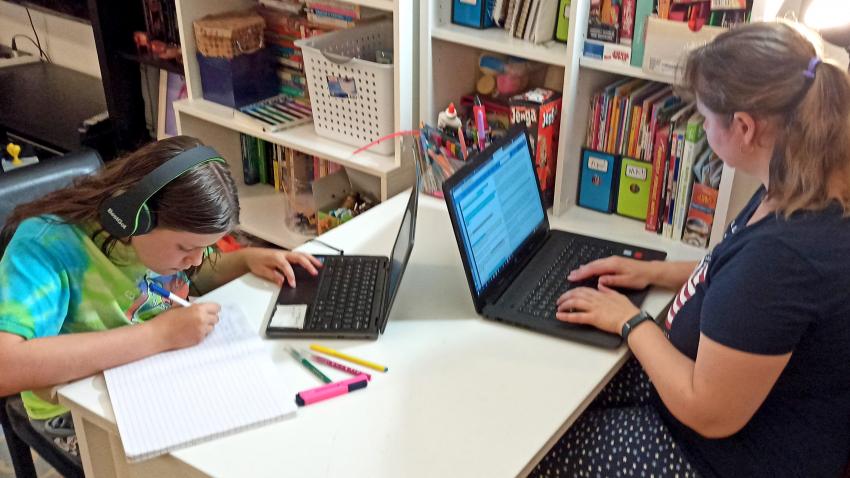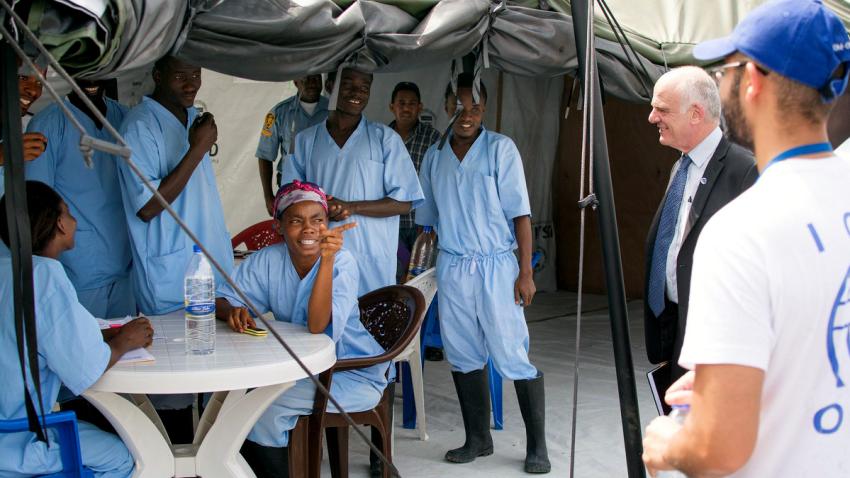Multilingualism is a core value of the United Nations, upheld in the deliberations of the General Assembly and other bodies through the simultaneous interpretation of proceedings and the translation of documentation into all six official languages, plus in the case of translation, German. When the onset of the COVID-19 pandemic abruptly curtailed on-site activities at Headquarters and other UN premises, the translation services of the Department for General Assembly and Conference Management (DGACM) transitioned to remote working almost seamlessly, continuing without interruption their important role as guarantors of multilingualism.
“Several factors enabled us to transition so easily, not least our commitment to remaining at the forefront of language technologies and developing in-house our own suite of high-performance web-based tools,” says Oxana Sobkovich, from the Russian Translation Service, “DGACM had already implemented a fully electronic workflow and built a set of sophisticated computer-assisted translation and editing applications, such as eLUNa and UNTERM, to support the production of multilingual documentation. In addition, we had just reorganized all the translation services’ online resource libraries at the end of 2019 and started working with Sharepoint and Teams. Although the current working conditions are far from ideal and pale in comparison with our normal operations, we were able to adapt to the challenging circumstances and operate in crisis mode since mid-March”.
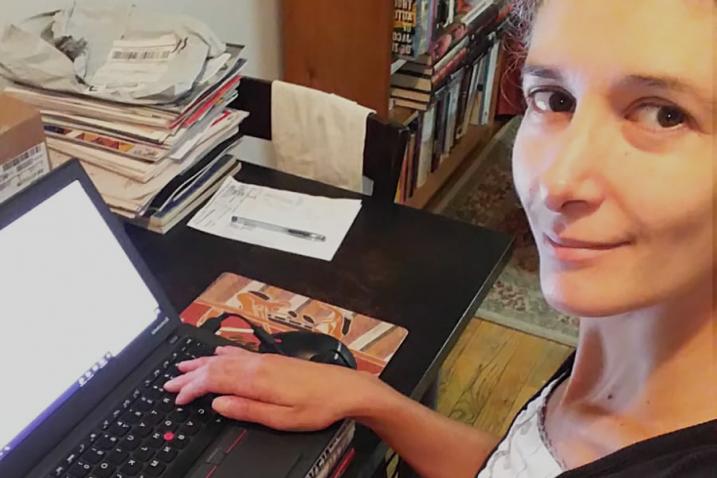
Even strategic activities such as recruitment had already shifted to the remote environment before the pandemic. The translation services held the first part of their sixth fully remote online competitive examination, this time for Spanish translators, editors and verbatim reporters, on 7 July with over 1,400 test takers. The Documentation Division (DD) also launched, on 1 April, its new online training platform, The SPOT (for self-paced online training), which contains over 500 learning activities created by translation and editing staff in DD for their colleagues. The project will be extended to other areas of DGACM and duty stations in the next phase.
The gText suite of translation, editing and terminology tools have proved invaluable, so much so that other departments and even other UN entities have asked to use them. In April, staff from the Department of Global Communications, as well as interpreters and verbatim reporters from the Meetings and Publishing Division (who were pitching in to help with the heavy workload in DD), were set up with the tools, and that same month the World Health Organization became the latest organization to join the family of UN entities that have adopted eLUNa and UNTERM as their translation and terminology solutions.
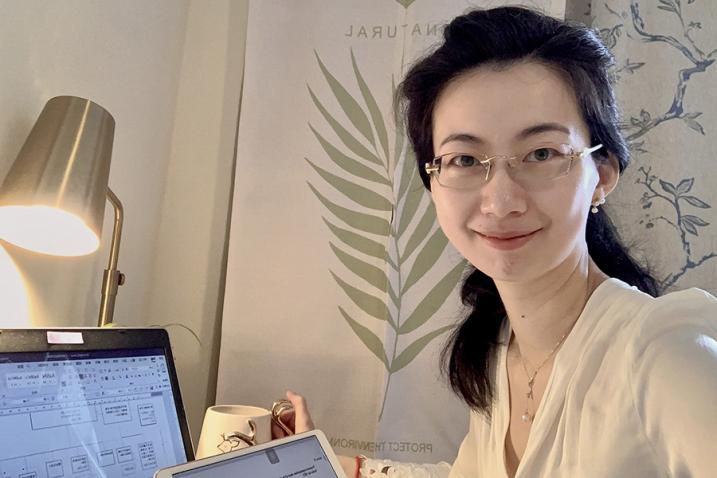
This does not mean it was all plain sailing. When mandatory teleworking started, the vast majority of DD staff used their own computers to deliver their work, but several staff members did not have the equipment they needed to work from home, which threatened business continuity. Laptops and monitors were quickly secured from limited supplies, and in a show of solidarity and team spirit typical of DD staff, colleagues loaned spare laptops to one another to fill the gap. Staff who were assigned laptops by OICT had to then make their way to the Secretariat Building to collect them at scheduled times for health and safety reasons. For many, this meant several hours of walking to avoid the subway at the height of the pandemic. The necessary software applications were then installed remotely with the Business Analysis Section of DGACM and OICT support.
"I'm really grateful for the help in installing macros remotely; it was a life-saver," said Carla Mavrodin of the English Text-Processing Unit.
The challenges did not end with the procurement of basic equipment. Editing and translation are highly intellectual activities and require working in an environment conducive to extended hours of uninterrupted concentration in front of a computer screen. Few staff have suitable workspaces at home. Most live in typical New York apartments, which are very small compared to apartments in other cities, with no room to add a desk.
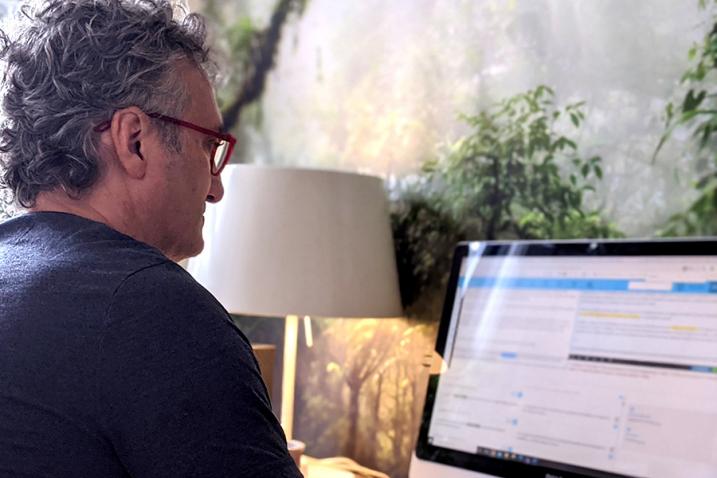
“At first I was mostly doing my work on a laptop sitting on the couch; but my back and neck really began to suffer. I now try to change position several times a day and move from the couch, to the bed and then the kitchen counter, but it is far from ideal,” said Tala Zgheib of the Arabic Translation Service.
“I really miss my two large monitors,” added Heng Tan, from the Chinese Text Processing Unit. “I find having to click between different tabs to view my resources instead of viewing them on another screen really slows me down. Formatting complex charts and graphs and proofreading a large budget document on a small screen is also much less efficient; I have to scroll up and down, zoom in and out far more often to read the segment in context. It strains the eyes, too.”
Finding sufficient quiet time was a challenge for many. For some, sharing a workspace with a spouse whose job involved a lot of time in video or phone calls was a major source of stress; for others it was combining teleworking with what was effectively home schooling.
“My children were home, and having to supervise the remote learning and after-school care of a highly active 7-year old and an 11-year old, meant that the interruptions were constant. Translation requires concentration, and I kept having to reread what I had just written and pick up my train of thought again or put off my own work until nighttime,” said Olga Begisheva of the Russian Translation Service.

“My two teenagers had a hard time adjusting to remote learning. I was getting phone calls and emails from their teachers almost weekly about their drop in performance. It was a real struggle having to check up that they were doing their school work, remind them of meetings, arrange videoconferences with teachers, etc. while also trying to run the household, support my husband who had suddenly been left jobless and get my own work done,” added Karina Tabacinic of the Spanish Translation Service.
Flexibility and compromise and non-standard work schedules seem to have been the best coping mechanism.
“My ideal plan was to get up very early to try to get the bulk of my work done in the morning, so I could use the afternoon for homeschooling, house chores and caring for my son; with perhaps an extra hour or two once my son is in bed to complete my working day. But, despite my best efforts, plans go wrong. Distractions and interruptions are continuous during the day, which makes me less productive in the hours I assigned to work in the morning, which forces me to longer sessions in the evening to complete my daily goals. Some weeks have been extremely difficult,” said Guillermo Siminiani, also from the Spanish Translation Service.
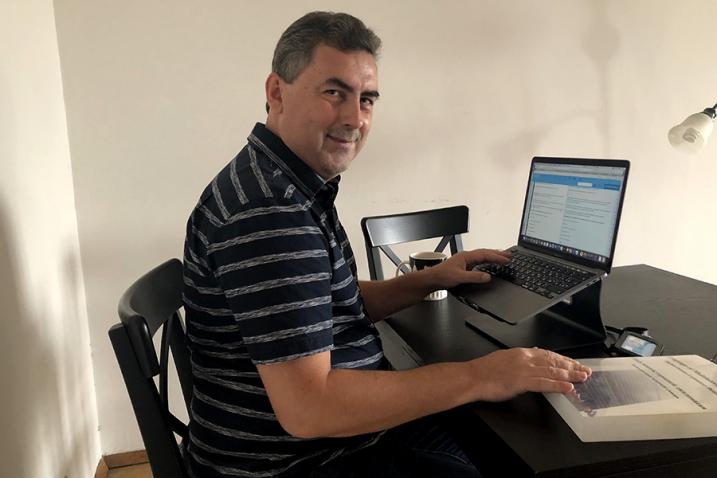
Despite the turmoil in the personal lives of the editors, translators and text-processors have been able to produce the multilingual documentation on which the work of the Organization depends. “I am very proud of the dedication and commitment shown by the staff of DD,” says Cecilia Elizalde, Director of the Documentation Division. “They rose to the challenge and responded with extraordinary team spirit.”
It is that sense of being a member of a team that many DD staff fear losing most if mandatory teleworking is prolonged well into the future. “Much as I still get the satisfaction of a job well done and feeling I am contributing to the work of the Organization, I realize now that what made my work so rewarding and enriching were the spontaneous interactions with colleagues," says Cheng Bi of the Chinese Translation Service.
This thought has been echoed by many, “I feel I am coasting in emergency mode – I can keep this up for a certain amount of time, but I am not getting any better at my job, and one of the hallmarks of the UN translation services is the constant learning, and much of that happens through exchanges of ideas and discussions with colleagues.” said Sandra Linden of the French Text-Processing Unit.
“I think we have succeeded so well during the mandatory teleworking phase because we were strong cohesive teams before the pandemic struck” notes Oleg Chuykov of the Russian Translation Service. “We are all recruited through the same open competitive examination process, we all share the same main language, and within each function, we all do pretty much the same job, so we are well positioned to help each other out, answer queries, share tips and tricks and things. We are used to consulting one another and have now switched to doing that virtually rather than by knocking on a colleague’s office door.”
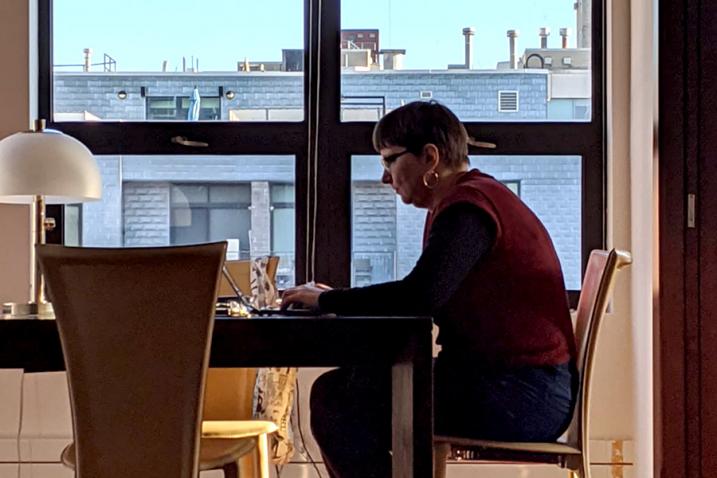
That may not be happening as much as when colleagues work together in the same building, however. Even now that people have figured out how to use the new remote communication tools and who prefers to be contacted by email, who by phone and who by chat, they tend to be warier of contacting colleagues because they know many are working strange shifts because of the circumstances at home.
To address some of these concerns, some services have organized regular virtual coffee gatherings on Teams, and the Division has organized a series of online lectures to replace the ones previously arranged in the Albano building where it is located. These have covered a whole range of topics, from remote tours of artwork, to how COVID-19 case projections are calculated, to yoga classes. To complement the self-paced learning activities in The SPOT, small online discussion groups and workshops have been organized to build skills and increase knowledge transfer. In this and other ways, the Division’s staff continue to innovate, build resilience and support one another.
Some wonder how long they can continue operating in emergency mode without their usual working conditions and the regular stimulation and support that the office environment provides. Physically distancing is affecting other aspects of work life.
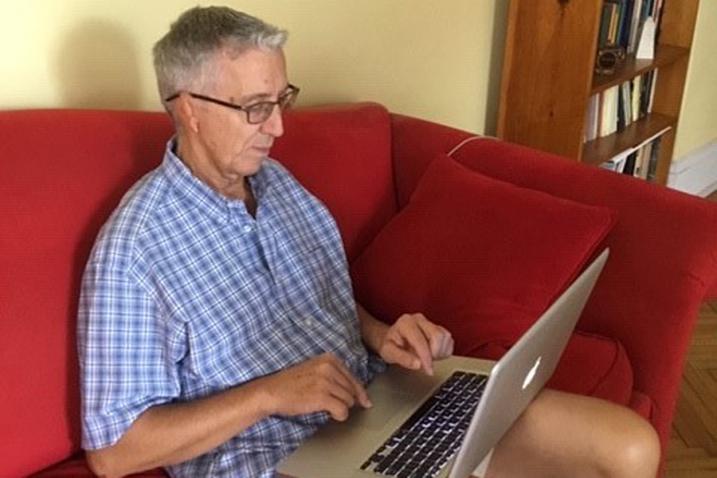
“Many of us are realizing how uplifting our regular contact and informal exchanges with colleagues were – we miss those interactions in the pantry or the corridors and elevators, on the way to meetings or training sessions, the shared a pot of coffee or the meet-up for lunch,” says Isabelle Delatour, of the French Translation Service, “The interaction in a virtual meeting is not just 'not the same', it is 'not as good.' Speakers can’t gauge the mood, people don’t participate as much, and conversations become one-sided or stilted. Online social events, such as after-work get-togethers, coffee-gatherings, farewells and celebrations, have also proved disappointing and been abandoned. It is really sad not to be able to give retiring colleagues, for example, a proper send-off. We are used to coming together at work to mark the special events in our lives, the births, the engagements, the marriages and the promotions. As international staff with our families and friends very far away, these gatherings are particularly important.”
For now, the need to rise to the occasion is motivating and rewarding.
“We can do this, and we are willing to do this, despite the personal difficulties and even across time zones, because this is a crisis situation, but I am not sure how long working at this level and at this pace under these conditions is sustainable,” worries Frank Schramm, from the German Translation Section. “However, we pride ourselves on our professionalism, on our ability to deliver high-quality translations on time, as the United Nations and the public worldwide deserve. And knowing the UN translation services and their capacity for innovation as I do, I am sure we will find the ways and means to continue to do that.

